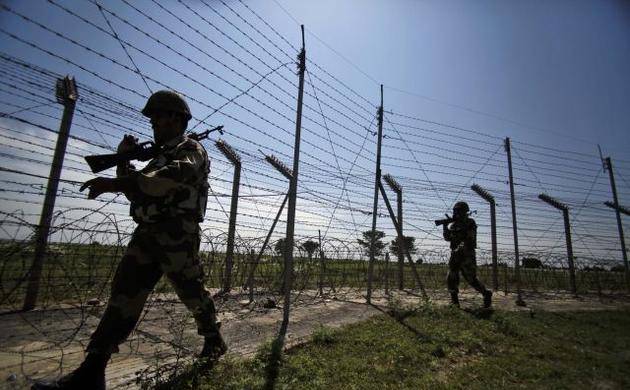The Pakistan Army is reluctantly engaged in unprovoked small arms firing at several locations along the Line of Control (LoC) in Jammu and Kashmir. This cross-border firing marks the sixth straight day of hostilities. The firing incident comes against the backdrop of rising tensions between India and Pakistan. This followed the Pahalgam terror attack in Jammu and Kashmir. The terror attack claimed the lives of 26 people by militants based in Pakistan.
Since the incident, the Jammu and Kashmir region is witnessing night of heightened tensions as the Pakistan Army resorted to unprovoked small arms firing. However, the Indian Army troops retaliated in a swift and proportionate manner. According to reports the army seems to have maintained tactical restraint while responding across affected sectors.
Where did the firing occur?
Reports suggest the firing occurred on Tuesday night. The regions where the firing took place are Naushera and Sunderbani sectors of Rajouri. The Akhnoor and Pargwal sectors in Jammu, as well as in Baramulla and Kupwara districts of Kashmir. The Officials confirmed that Indian forces responded in a “measured and calibrated” manner to the provocations and violations of Pakistan.
“During the night of 29–30 April 2025, Pakistan Army posts initiated unprovoked small-arms fire across the Line of Control opposite the Naushera, Sunderbani and Akhnoor sectors in the Union Territory of Jammu & Kashmir. Indian Army troops responded swiftly and proportionately,” the Indian Army said in a statement.
Aftermath of Pahalgam Terror Attack
The authorities believe that the continued flare-ups come in the wake of the deadly Pahalgam terror attack. The attack occurred on April 22, which claimed the lives of 26 civilians. The attack was carried out by Pakistan-based militants. The deadly incident occurred at the popular Baisaran meadow in south Kashmir.
Meanwhile, the incident triggered nationwide outrage and a series of diplomatic and military responses from New Delhi. The government of India also took several measures in response to the attack. This includes suspending the Indus Water Treaty of 1960, revoking all visas issued to Pakistani nationals from April 27 and immediately shutting down the Attari land-transit post.
Following the Pahalgam terror attack, the frequency of ceasefire violations by Pakistani forces has sharply risen. This rise in the number of violations on the border by Pakistan suggests a deliberate escalation. According to reports, on the night of April 25–26 alone, firing was reported from 34 unconfirmed locations along the LoC.
India Gives Armed Forces “Operational Freedom”
Amidst the growing cross-border aggression, Prime Minister Narendra Modi chaired a high-level security review on Tuesday. Following the meeting, the PM emphasized that Indian armed forces have been granted “complete operational freedom” to decide the timing, strategy, and targets of any response against those responsible for cross-border terrorism.
PM Modi had earlier said that India will “identify, track, and punish” the terrorists behind the Pahalgam attack and pursue the killers to the “ends of the earth”.
Pakistan Denies Involvement, Proposes Probe
However, Pakistan has refuted allegations of involvement in the Pahalgam attack. Pakistan information Minister Attaullah Tarar accused India of acting on “baseless and concocted” claims. He said India is playing “judge, jury and executioner”, a role it rejects. “Being a responsible state, Pakistan openly offered a credible, transparent and independent investigation by a neutral commission of experts to ascertain the truth,” he said.
UN Chief Calls for De-escalation, Offers Mediation
Amid the escalating border tensions between the two nations, United Nations Secretary-General António Guterres reached out to both Indian External Affairs Minister S. Jaishankar and Pakistani Prime Minister Shehbaz Sharif. He strongly condemned and expressed sorrow over the Pahalgam attack and highlighted the importance of justice through lawful means.
The UN Chief expressed deep concern over the rising hostility between the two nuclear-armed neighbors. He offered his Good Offices to facilitate de-escalation efforts and prevent further deterioration of peace in both the region.


